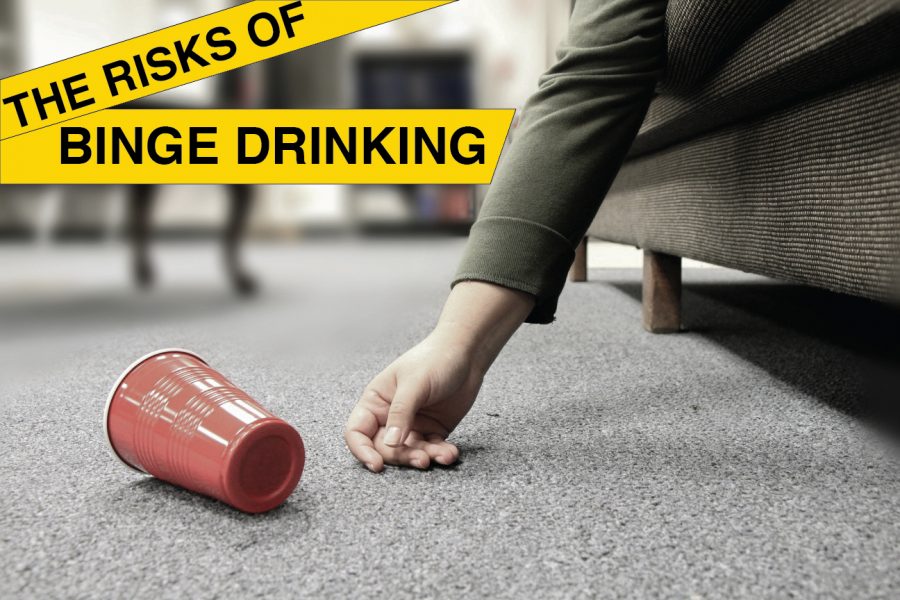The risks of binge drinking
March 16, 2019
Eric vaguely remembers falling and crashing through his oven door.
One Sunday, in January of 2015, Eric, who wishes to not disclose his last name, had some co-workers over for drinks. The CSU Bakersfield student works as a server at a local restaurant that he didn’t want named. Having friends over was usual, but this Sunday Eric had too much to drink. He had drank enough that his memory was spotty.
“I remember fake boxing a friend, and I fell in the kitchen. I shattered my oven door; I wasn’t wearing a shirt and was covered in cuts,” said Eric.
Eric ended up on a Snapchat video that his managers and employers saw. Eric didn’t have any major consequences from this incident, however, he could have been seriously injured in the fall, he could have lost the respect of his employers, he could have lost his life.
While a small number of students die directly from alcohol poisoning, there are other dangers that accompany drinking too much.
According to the National Institute of Alcohol Abuse and Alcoholism, around 1,825 college students die annually of alcohol-related injuries like accidents and car crashes. Another 696,000 students are physically attacked by another student who’s been drinking. 97,000 students report being sexually assaulted while alcohol is a factor, and one in four students report suffering some sort of academic setback due to alcohol-related issues.
The excessive drinking associated with St. Patrick’s Day comes from the holiday being recognized as a feast day on the Catholic calendar. College life has ritualized drinking, drinking games, and parties, so students are even more likely to celebrate this holiday by drinking. When does it become too much? There is a serious health risk that should be considered when any sort of alcohol consumption is taking place; that risk is alcohol poisoning.
According to CSU Bakersfield health educator, Lauren Ash, “alcohol poisoning can happen to anyone who is drinking alcohol faster than their body can process it.”
Specifically, anyone who is binge drinking is especially susceptible. Ash explains that binge drinking is defined as drinking four or more drinks for women or five or more drinks for men, in a two-hour period. The size of a standard beer is 12 ounces, wine is 5 ounces, and hard liquor is 1.5 ounces. Activities that college students participate in, like drinking games, create an ideal environment for binge drinking and alcohol poisoning. Drinking too much effects heart rate, breathing, gag reflex, body temperature, or causes coma and death in some cases.
One of the myths surrounding alcohol poisoning, especially extreme cases, is that you can sleep it off.
“When we are talking about alcohol poisoning, someone will need immediate medical attention. We don’t want to let them sleep it off, we don’t want to leave them until they have received medical attention, just to be safe,” said Ash.
Another myth about alcohol poison is that you can simply sober up by drinking water, eating food, or having some coffee. This is just not true. Once alcohol is in your body, it is affecting you.
“The only thing that is really going to sober someone up is time,” said Ash.
After Eric’s experience, his perspective has changed. “I don’t drink like I used to,” said Eric. “I’m learning to play the game, drinking slower, and drinking longer, as opposed to drinking heavily all at once.”
So, how do you know if you or your friends have alcohol poisoning? There are signs to watch for. The CSU system uses a website, awareawakealive.org, to educate students about the dangers of alcohol poisoning. Aware, Awake, Alive uses an acronym to remember these signs.
M.U.S.T. H.E.L.P.
•Mental confusion
•Unresponsive
•Snoring/gasping for air
•Throwing up
•Hypothermia
•Erratic breathing
•Loss of consciousness
•Paleness/blue skin
“Someone doesn’t have to have all of those symptoms. Even if they only have one of them they could be at risk,” Ash said.
Some ways to prevent binge drinking are simply moderate how much you drink by drinking slow. Don’t go out to get drunk. Drink socially, have a plan with a friend to watch out for each other. Avoid drinking games that encourage binge drinking. Space out drinks by having a glass of water in between and always have a sober driver.
For more information visit:
•niaaa.nih.gov (National Institute on Alcohol Abuse and Alcoholism)
•awareawakealive.org (Aware Awake Alive, non-profit)
•Or go to Student Health Services on campus. Counseling information is also available for anyone who thinks they might have a problem.







